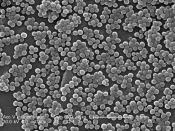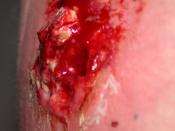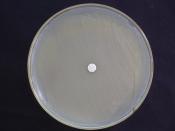What is a Super Infection?
Super infection results from organisms that become resistant to the drugs previously used to treat them. This condition has been speculated to be caused, in part, by the over use/misuse of antibiotic therapy.
Transmission:
Primarily transmitted by colonized/infected patients and health care workers and contaminated equipment.
Inadequate hand washing by hospital staff has been implicated in the spread of these pathogens among patients at risk.
A factor implicated in the transmission of MRSA is transfer of nursing home residents to acute care hospitals and then returning to the nursing home.
The spread of VRE has been associated with not only health care workers, not also the use of contaminated patient care equipment such as electronic thermometers.
Who's at risk?
The older adult
Patients with debilitating illnesses
Patients with invasive lines and tubes are at an increased for MRSA
Prolonged use of indwelling urinary catheters, endotracheal tubes, mechanical ventilation, and vascular access lines also increase the risk significantly.
Types of Super-infections
MRSA:
MRSA is a mutation of very common bacterium spread easily by direct person to person contact. MRSA incidence is now epidemic in nursing homes and LTCs as well as community hospitals. MRSA is a gram-positive bacterium called Staphylococcus aureus normally found on the skin.
Etiology:
Individuals where the natural defense system breaks down, such as after an invasive procedure, trauma or chemotherapy the normally benign bacteria can invade tissue. Proliferate and cause infection. Today up to 90% of S. aureus isolates or strains are penicillin resistant and about 27% of all S. aureus isolates are resistant to methicillin. These strains may resist cephalosporins, aminoglycosides, erythromycin, tetracycline and clindamycin. MRSA has become prevalent with the overuse of antibiotics.
Diagnosis:
MRSA can be cultures from the suspected site with the appropriate culture method. I.e. swab, sputum...


